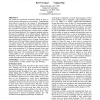Free Online Productivity Tools
i2Speak
i2Symbol
i2OCR
iTex2Img
iWeb2Print
iWeb2Shot
i2Type
iPdf2Split
iPdf2Merge
i2Bopomofo
i2Arabic
i2Style
i2Image
i2PDF
iLatex2Rtf
Sci2ools
111
click to vote
CSCW
2002
ACM
2002
ACM
Explaining effects of eye gaze on mediated group conversations: : amount or synchronization?
We present an experiment examining effects of gaze on speech during three-person conversations. Understanding such effects is crucial for the design of teleconferencing systems and Collaborative Virtual Environments (CVEs). Previous findings suggest subjects take more turns when they experience more gaze. We evaluated whether this is because more gaze allowed them to better observe whether they were being addressed. We compared speaking behavior between two conditions: (1) in which subjects experienced gaze synchronized with conversational attention, and (2) in which subjects experienced random gaze. The amount of gaze experienced by subjects was a covariate. Results show subjects were 22% more likely to speak when gaze behavior was synchronized with conversational attention. However, covariance analysis showed these results were due to differences in amount of gaze rather than synchronization of gaze, with correlations of .62 between amount of gaze and amount of subject speech. Task ...
| Added | 18 Dec 2010 |
| Updated | 18 Dec 2010 |
| Type | Journal |
| Year | 2002 |
| Where | CSCW |
| Authors | Roel Vertegaal, Yaping Ding |
Comments (0)

